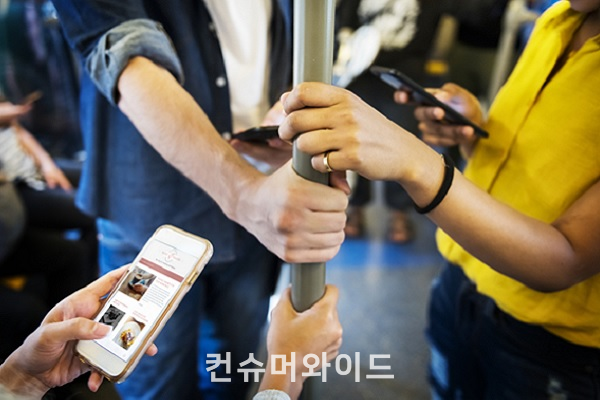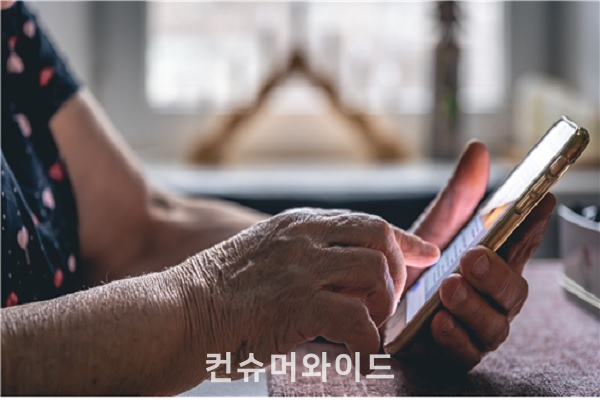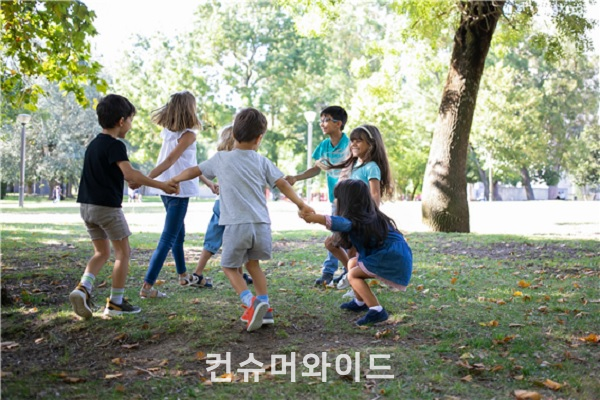The era of Phono-sapiens, where the smartphone is closely tied to human life, pretty much does everything using a smartphone, it is inevitable to face Alzheimer's disease, which lacks 'humanity'.
What is emphasized in Alzheimer's disease prevention is a healthy habit. In particular, physical activities are compulsory...Building a sports habit is a value consumption to prevent Alzheimer's as well as a value investment.

[Consumerwide_ Eunmi Yang / Yohan Bok Reporter] The writer is someone who feels secure by getting to the place of appointment at least 10 minutes earlier. One day, last summer, I was at the bus stop waiting for a bus, having plenty of time before an appointment just as usual. But, then, I totally forgot my smartphone, which I realized by the time I put my hand in the jacket. What if I just get my phone after the appointment with the bus approaching right now? Or, should I go home straight ahead to pick up the phone? My conviction that I was never late for an appointment fell to the ground within a few seconds of facing "No Mobile-phone Phobia". Feeling uncomfortable, I went directly home to pick up my phone. I could have just gone without a smartphone considering it was only one afternoon.
'No Mobile-phone Phobia' is one of the new words that came out at the end of 2000, and this word ranked in the 'year of word' in the Cambridge dictionary in 2018 because of its popularity. It seems to me that many feel somehow insecure when their phone is not with them because the smartphone is tightly connected to the daily schedule. In particular, teens are known to touch their phones regardless of their schedules, and they are observed to express frustration if they're forced not to use smartphones.

Homo-Saphiens moved on to the new humankind, 'Phono-Saphiens', who cannot live apart from smartphones.
■ Tiresomeness of dolden agers in Phono-Sapiens time.
The entire world seems changed by smartphones. Not only, public phone booths have disappeared, which was quite a long time ago, but banks are also rarely found. Other than drawing cash, you have access to nearly everything about banking. Now, banks are discovering no reason for their existence, but leaving the ATM behind. Not only so, Kiosk and Smart-pads are replacing cafe and food restaurant orders.

I helped an elderly person by giving him information about the alternative location of the bank. The bank he was looking for had already been removed since he last came, which was long ago. He was thanking me and turned his footsteps to find another bank in the distance. Tiresome emotion was felt in him when he was about to leave.
There are times I get to see elderly people standing in front of restaurant kiosks seeming troubled about using the machine. As time passes by, the line gets longer behind the elderly. Nevertheless, if any younger person assists him with order, the line can be reduced quickly. Elderly people seem to have gratitude towards anyone who comes along, yet, they feel sorry about the situation.
Whenever I bump into a banner about smartphone training programmes in domestic areas targetting elderly people on the street, I am quite positive about it. However, referring to research announced by the ministry of public healthcare and welfare in 2022, 7 out of 10 elderly people feel uncomfortable about using digital devices. Considering that elderly welfare centers are occupied in large cities and the population of elderly people in the entire domestic area, user rates for devices aren't high enough. It is predictable that elderly people are more likely to learn to use smart devices through their children or grandchildren.
These are the stories of the elderly people I met who were living in Phono-sapiens, during senior training and group counselling. Having been exposed to newly released apps, which give access to many tasks at home, might be convenient for younger people. However, it might be tiresome homework for a generation who aren't familiar with smartphones yet. "No end to learning" might sound disappointing to them.
■ Nurturing children in Photo-sapiens perspective
Digital devices are a kind of magic lamp for moms who care for children. When her child cries and is discontented, she can provide fun content in a few seconds by touching her smartphone. The child soon stops crying and starts to focus on the phone. Eventually, mom can enjoy her time with her visitors. This is what I see often in restaurants and homes. Today, the smartphone is replacing the TV to provide fun content, but without limits on space and time.

The writer met quite a number of children who were predicted to have ADHD or lacking understanding of emotions, while doing a voluntary counseling session in elementary schools. When those children begin telling about their dreams or role models, often a smartphone game's main character or a popular youtuber comes out in the story.
Children who went through the Covid19, an untact time which is found nowhere in the historical timeline, have a tendency to perceive emoticons and munja (text messages) using cellular phones as more convenient than communicating through other types of methods. So, when I had the opportunity to work for them, I tried to encourage them to share thoughts by speaking directly with confidence. I don't want to play a person stuck in their 80s. However, these new middle-aged people spent their childhood in an environment where they have no access to smartphones nor extra hours of classes, but played along in groups playing outdoors touching soil, flowers, stones as their playground. This is the way they've learnt to share emotions on the social stage by directly interacting with people around them, hearing and feeling their thoughts and ideas. Can all these emotions learned through words, facial expressions, and body language be replaced by emoticons and text messages?
I suspect that if children grow up in the condition where social communications are mostly done through smartphones, in the end, they will grow up feeling uneasy about relating to people. In addition, children have got to build their own experiences by repeating failures and successes, making choices in various situations. This is only the way for them to grow with desires while getting mature in thinking and identity. Nevertheless, if they get constantly exposed to smartphones and when it becomes their major source for everything, they will miss out the time to grow mature in their own thoughts, desires, and identities. Motherhoods today are mostly the mobile-phone generation as well, since their youth years. So, how easy it can be to use smartphones for children's education and discipline. I understand to full extent those stresses they might have because I am the mom of two grown boys. Nevertheless, I encourage young mothers to remember this. As soon as children approach their teens, they will spend more time on their phones than their parents. They might ask mom to get them snacks through a text message. Before the time turns, if you try to talk with your child in person, having eye contact, even if that costs you more work and energy, you may get to have an awesome memory of your child a long time back.
■ What can you do to prevent losing humanity in the times of Phono-saphiens?
It isn't easy to get away with Alzheimer's, which one gets to losing humanity, even those Phono-saphienses. One of the practical steps to prevent Alzheimer's is a healthy life-habit, in particular, physical activities.
Dr. Manfred Spitzer, who is famous for raising awareness of Digitization by mentioning Digital Alzheimer's, talked about the importance of healthy physical activities and maximum intellectual training during childhood and teenhood in order to prevent Alzheimer's.
Men surely get weaker after they complete physical growth, just like other living beings. The more they go up, it takes longer to go down. Likewise, physical health and the mental capacity work the same. This is the reason why maximum intellectual training for childhood and teenhood through education matters. Research into physical activities stimulating brain nerve cells has been proved through studies. Thus, Dr. Manfred Spitzer's message, telling physical exercise to be the best source of brain jogging, is alarming the generation that absolutely rely on smartphones. (* “If you are serious about the brain jogging that should improve your psychic condition when you retire, turn off the TV or computer screen, invite your grandchildren and go with them for a walk in the woods” (p. 283)/ Recenze Marek Preiss Manfred Spitzer: Digital dementia: What We and Our Children are Doing to our Minds. Brno: Host, 2014 )
I am amazed by AI robot technology for elderly people's training, which assists them to restore cognitive abilities, and children's education, such as edu-tech, yet afraid of unknown future results. What would be the next skill the day after? I am grateful for the AI technology. However, I can not get rid of fear. Maybe I am thinking about the future of facing an AI having the equal personality of mine.
In conclusion, the writer, though I am too Phono-saphiens generation, wants to reassure families would go out even if it's only one day every week holding hand of your child and spending time in parks or mountains, a nature environment. Surely, phones are out of your hands on this smartphone free day in exchange for humanity. In particular, using your time and energy for making a habit of physical activities matters the most considering their very future, preventing Alzheimer's. Alzheimer's prevention is so important and as much as to be emphasized from a very young age. Making a habit for physical activities is value-consumption and investment.
P.S.: The writer's book, "From Alzheimer to well life, senior essential knowledge", I apologize for wrong spelling in the first edition. (뇌졸증>>뇌졸중) We will thoroughly re-edit them, and our second edition will be alright. Thank you.
- [Column-Senior Well Life-Consumption value ①] "An old gentle man in the beautiful evening twilight and a lovely lady with Alzheimer's"
- [Column-Senior Welllife-Consumption value ③] “New middle-aged people have got to take advantage of leverage in life”...Design your time with value consumption.
- [Column- Senior Welllife Consumption value⑬] Walk properly with good posture..Consumption value based on healthy life habits.

